Amputees want more help for limb loss mental anguish
- Published
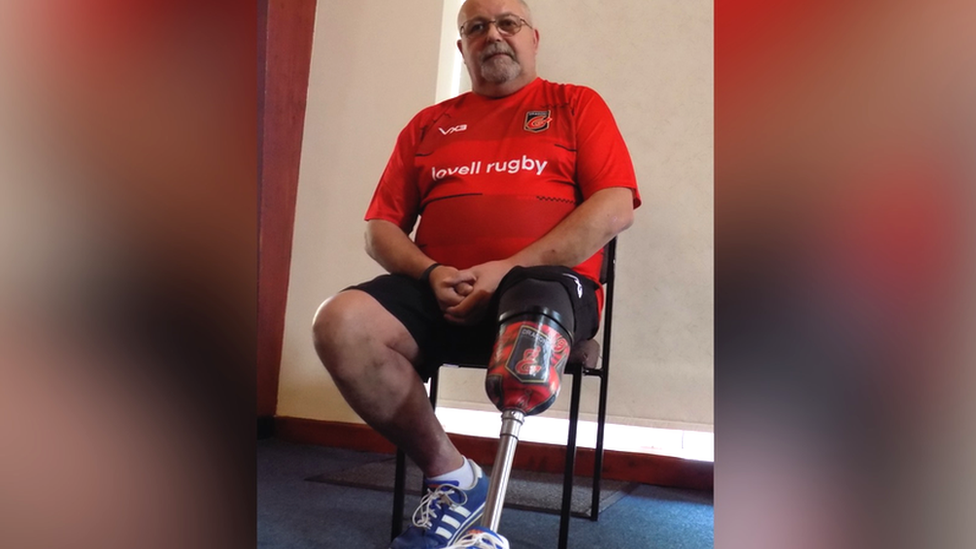
Barrie Evans wants to see patients offered mental health support before an amputation
When Barrie Evans had his left leg amputated he felt he had "nothing to live for".
"I couldn't support my family, I couldn't pay my bills, I ended up on suicide watch," said Barrie, 60, from Rogerstone, Newport.
He now runs a support group and is calling for more mental health aid for those who experience limb loss.
The Welsh government said deciding appropriate rehabilitation services was the responsibility of health boards.
Barrie lost his leg in October 2018. He has type 2 diabetes, external, which can reduce blood supply to the feet, meaning foot injuries do not heal as well and infections can develop. In serious cases amputations can be needed.
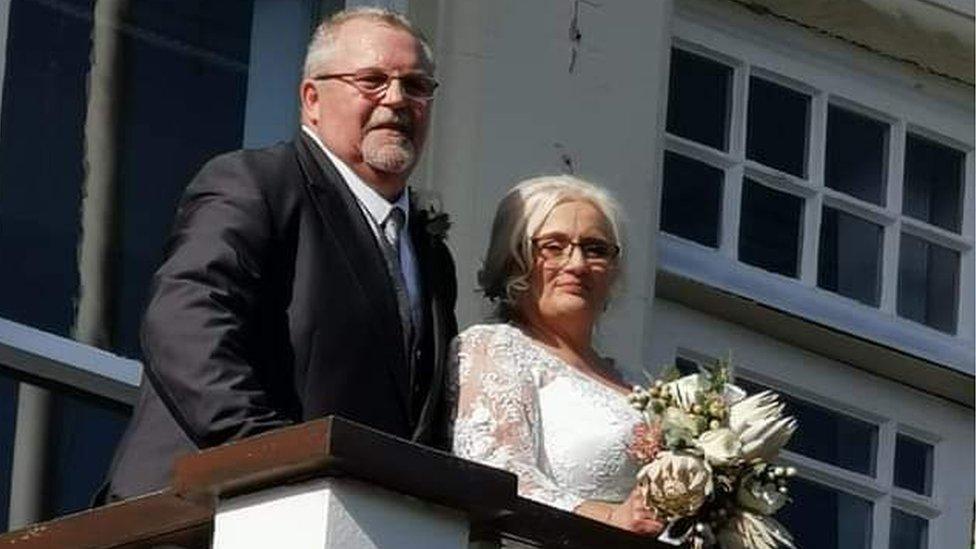
Barrie says walking his wife Trish down the aisle was a big motivation during his rehabilitation
He had already had a femoral artery bypass, external - an operation to bypass a blocked portion of an artery - in his left leg after being bitten by a spider when on holiday in Spain.
Then, in 2018, Barrie dropped a scaffold board on his right foot. It became infected and he developed sepsis, and had to have two toes and part of the underside of his foot amputated, as well as another femoral artery bypass.
While in hospital his left leg also became infected, resulting in a below-knee amputation.
Two days after the amputation, he became depressed.
"They took the bandage off and I looked at it and I thought 'where is my foot? Where's my ankle? Where's my shin?' and that's when it really hit me," he said.
"I felt changed, I felt disgusted with the way I'd led my life which had brought me to this. I went downhill."
He returned home where he had to wait for his wound to heal before he could begin rehabilitation.
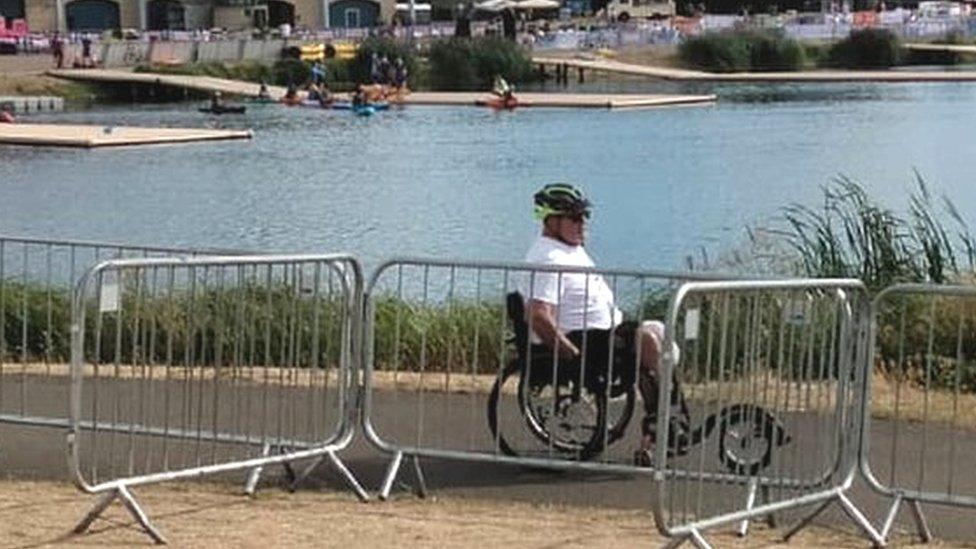
Since his amputation, Barrie has taken part in triathlons and plays wheelchair rugby
"I just had nothing to live for," he said.
"I spent nearly seven months on my own in my living room… I slept in my room, I washed in my room, I had a commode so I went to the toilet in my room.
"I couldn't be bothered. I just wanted to die. That's when the mental health team got involved."
Barrie eventually got the mental health support he needed and now works for charity Limbless Association.
He said he was determined that no other amputee should go through what he went through.
He runs a group that meets on the first Thursday of every month at Heath Citizens Community Hall at Heath Park, Cardiff.
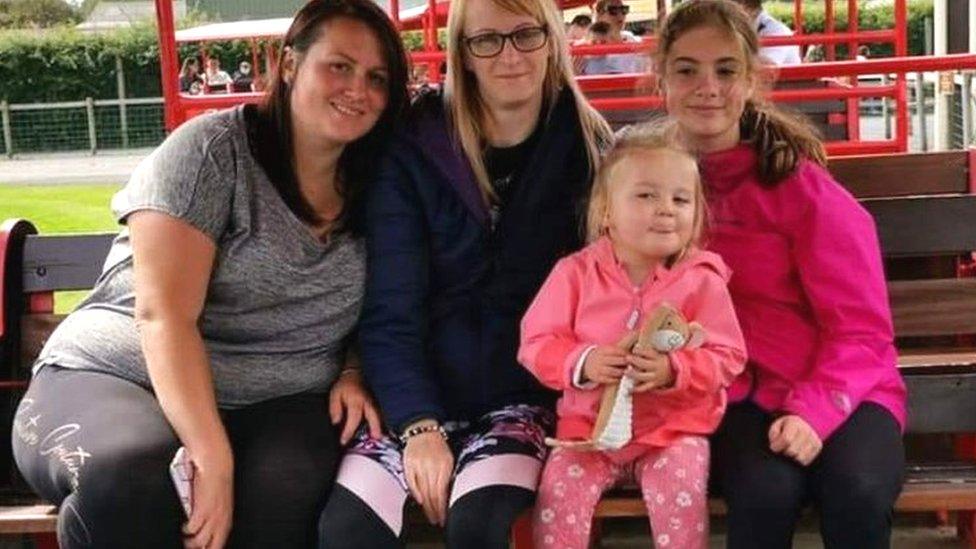
Katherine (second from left) lost her leg in 2017, but it was not until 2020 that her mental health faltered
Like Barrie, Katherine Williams, from Baglan, Port Talbot, also hit rock bottom after having her leg amputated.
The 37-year-old has type 1 diabetes, external, which can increase someone's risk of fractures.
In 2016 she thought she had twisted her ankle when putting washing on the line, but after walking on it for a year she discovered it was broken.
She spent months in a cast and had multiple operations which all failed before her leg was amputated below the knee in August 2017.
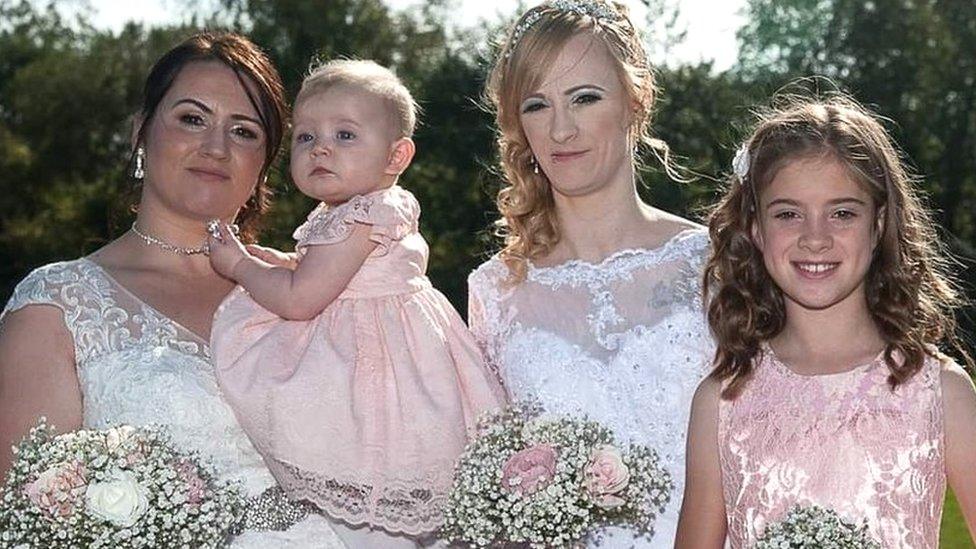
Katherine (pictured on her wedding day third from left) has type 1 diabetes which can increase someone's risk of fractures
Katherine said she coped immediately after the operation but during the coronavirus lockdown she hit rock bottom.
"I hadn't been sleeping properly, I'd been sitting up in a living room on my own most nights crying and I didn't know why," she said.
One night she was putting her young daughter to bed and her alarm went off to say her blood sugar levels were low.
"I thought, 'I can't be bothered, I'm just going to slip into a coma and die'," she said.
Thankfully her wife also heard the alarm and woke up and forced her to eat.
She had also stopped caring about things that would previously have been important to her, such as Christmas.
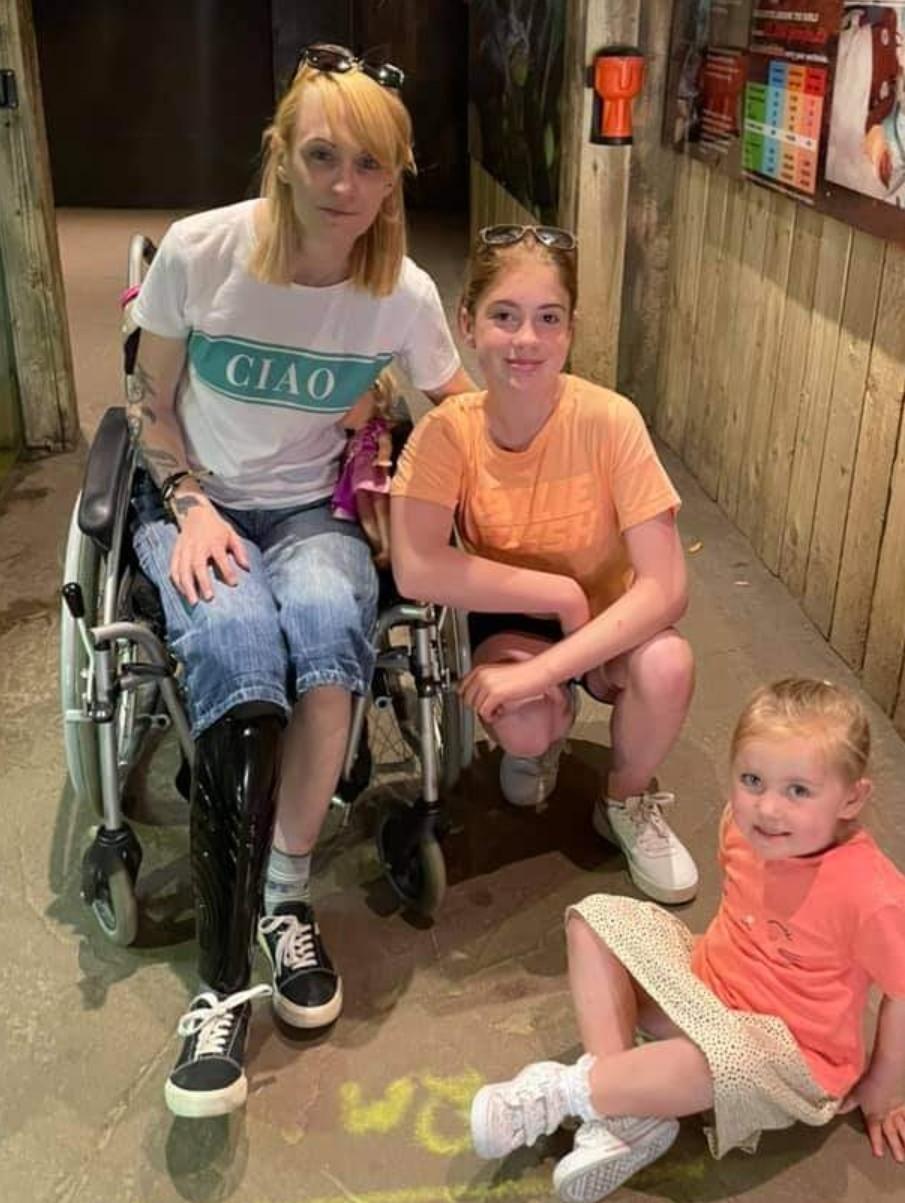
Katherine had her leg amputated below the knee in 2017
Eventually she spoke to her GP and realised the trauma of being diagnosed with diabetes at 15 and losing her leg had caught up with her. She was put on antidepressants and directed to mental health support websites.
She said within two months she was back to her normal self.
Reflecting on losing her leg, she said: "I had really, really good physical help but not once did anyone even ask if I was coping mentally with it… to this day no-one's ever asked.
"I still haven't had any mental health counselling… no-one's mentioned anything about counselling."
She would like to see mental health support offered to patients before and after an amputation.
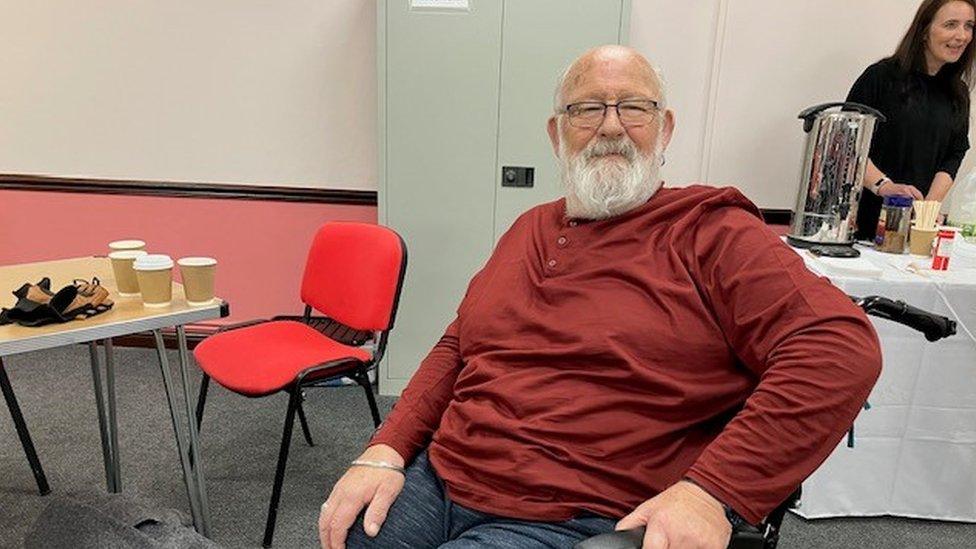
Beresford Wille says loneliness can be an issue after an amputation
Beresford Wille, 75, from Monmouth, who attends Barrie's support group, lost his right leg after being taken to hospital with a blood clot in June 2021. He too struggled after his amputation.
"I was put into a hospital room… where you've got nobody to talk to, nobody holding your hand, you wake up, you feel alone, desolate… but then you think 'well I'm not dead, I'm alive' and being alive is worth living isn't it," he said.
He said having contact with other amputees had been a big support.
"I think the biggest thing is loneliness… having a phone call every day off somebody would help, just contact really," he said.
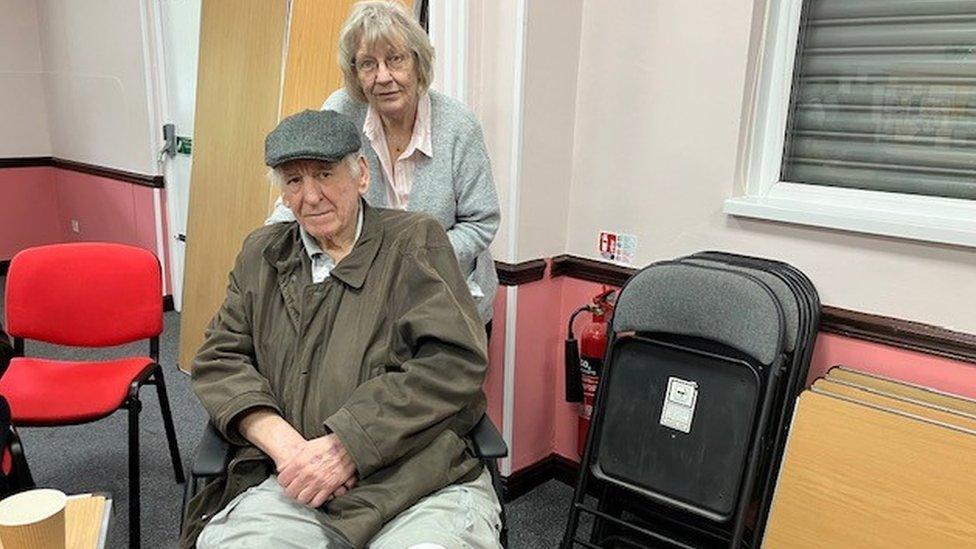
Anthony Wintle, pictured with his wife Judith, lost his leg in August
Anthony Wintle, 76, from Bedwas in Caerphilly county, attended the group for the first time this month.
He has type 2 diabetes and lost his leg in August after damaging his toes when he tripped over after going to a rugby match.
"[The hospital] did look after me before the amputation but afterwards once you've had the leg off and you're alright, that's it, you're just another person in the bed," he said.
"I didn't have psychiatric help in there at all, before or after."
Anthony said after returning home from hospital he was stuck in his house for three months because his wheelchair could not get through his door.
"It was a bit disconcerting to say the least," he said.
He said when he was in crisis there was no-one lined up to speak to.
"When I was upset, in the night if somebody had come then I could have talked to them. But there was no chance of getting that because by the time you call them up it's a fortnight before they can come, so you've gone past that stage of needing help and you've gone onto something else," he said.
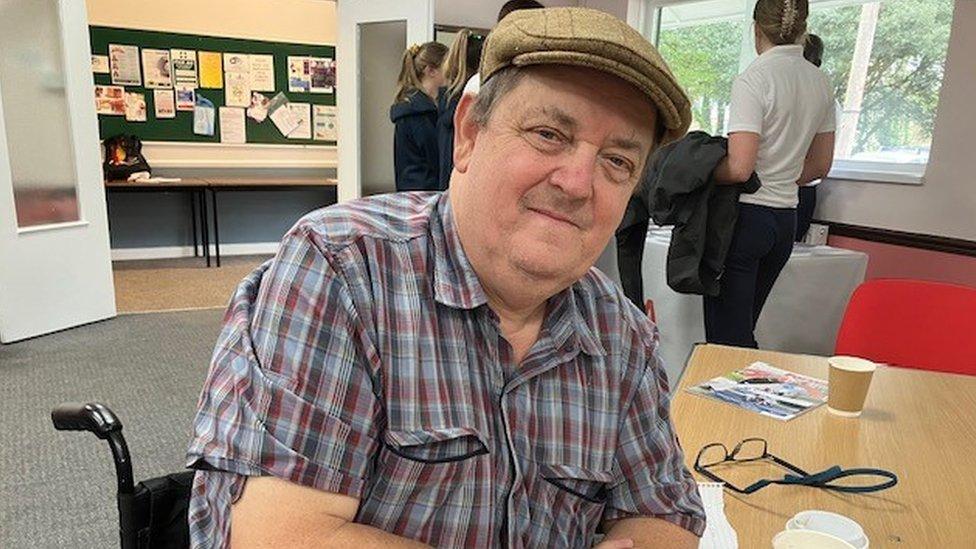
David Cox says he values meeting other amputees who understand his situation
David Cox from Newport, who has type 2 diabetes and has lost both his legs and a hand, likes to come to the group to meet people who understand his situation and share vital information.
"Things like how you get your driving licence back," he said.
"It's also nice to meet people in the same situation as yourself and have a cup of coffee and a chat."
Barrie wants to see a number of things put in place to support new amputees, including to see mental health teams getting involved with a patient before the amputation.
"I honestly believe that speaking to another amputee, a longer term amputee, would be most beneficial for all pre-elective amputees," he said.
He said support from staff in hospitals and rehabilitation centres was brilliant but it was the gap in between that had been neglected.
"When you come out of the hospital there is no support anywhere. I looked, I looked for months," he said.
"There is a massive hole between discharge from hospital to entrance into rehab."
He also wants information given to amputees about where to get support before they leave hospital.
A Welsh government spokesperson said health boards were responsible for deciding appropriate rehabilitation services, including access to psychological support where needed, and specialist rehabilitation was provided by three specialist centres in Wales.
"We have increased funding to improving access, quality and range of psychological therapies," the spokesperson added.
Barrie's own experience has made him determined to help others.
"I do not want any person who is about to have or has just had an amputation, or a long term amputee, to go through what I went through," he said.
"Life after limb loss is different but 90-95% of the things you did before you lost your limb you can do afterwards, but you've got to think about it."
"There is life after limb loss."
If you have been affected by issues raised in this article you can visit the BBC Action Line pages.
- Published12 March 2023
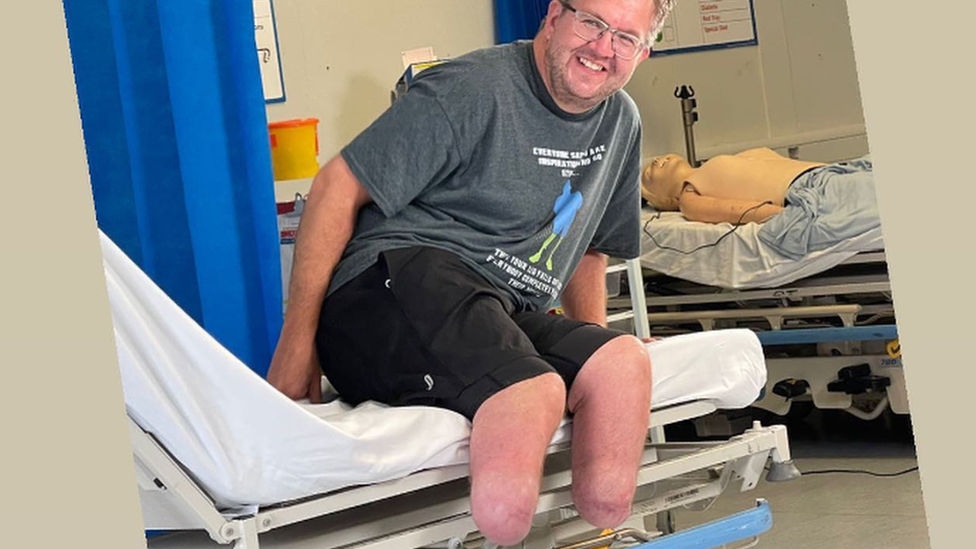
- Published4 February 2022
